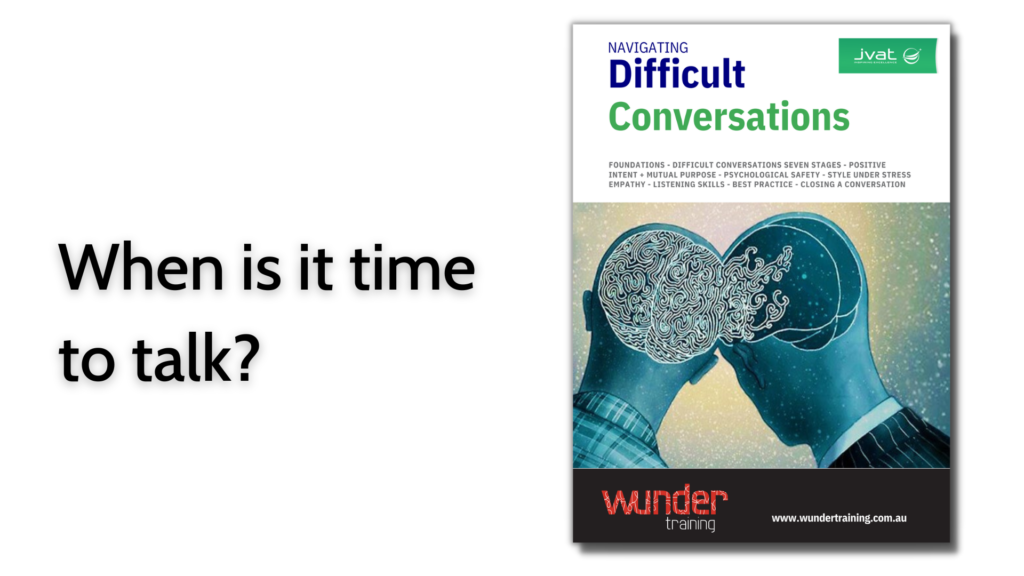
Jane Wundersitz

Those conversations can create unhappiness, stress, and tension and impair and destroy relationships. When handled poorly, they are likely to result in serious problems that interfere with productivity and leave everyone involved frustrated and dissatisfied.
You can’t avoid these conversations, but you can learn how to handle them more effectively. Addressing these challenges will pay off in terms of reduced stress, increased confidence, improved relationships, increased trust, fewer problems, better teamwork, higher productivity, and better career opportunities.
We worked with JVAT :
JVAT is a forward-facing risk and assurance consultancy firm that provides advice, services and products across the Defence, Government, Transport & Infrastructure, Energy & Resources and Not-For-Profit markets. They are curious and collaborative problem solvers, dedicated to supporting their client’s success by creating and delivering actionable insights and innovative solutions to hard problems. Their strength is fostering a positive and open culture between their team and clients – utilising collaborative working methods to maximise efficiency and productivity to support risk and assurance.
To support them in delivering these outcomes, they need advanced communication skills. We provided training to senior leaders, people and culture team members and various team members who support client needs. We tailored it to the group. An objective was also to provide a positive experience as staff were travelling in from different states, so positive strategic teambuilding was embedded in the event, enabling people to connect authentically.
Fantastic to support the fabulous leaders and service team at JVAT. Such an authentic and lively group to work with. A great team and an impressive culture.
“Thank you Jane for your amazing guidance and sharing with us the effective ways we can plan and deliver difficult conversations”
-Shayne Tolentino
Talent Acquisition Administrator at JVAT
Stage 1: Prepare for the Conversation.
Stage 2: Initiate the Conversation.
Stage 3: Deliver the message.
Stage 4: Listen and Respond.
Stage 5: Explore alternatives and solutions, if appropriate.
Stage 6: Close the conversation.
Stage 7: Follow up, if appropriate.
Conflict occurs when one person’s perception of what is happening is incongruent with what they think should be happening. Conflict is based on an event and has no innate emotion. We recommend speaking early when there is a level of discomfort. This is then a conversation before emotions might have escalated and can be as simple as saying, ‘I’ve noticed… I’m wondering… ‘
Wunder Training looks at the conflict cycle and also uses cards to help participants understand their style under stress. This insight can help them to recognise they need to have a conversation. An early conversation avoids a crisis.
We take people through a conflict cycle – which can assist in helping people to act early.
Difficult conversations nearly always go better when you take the time to prepare. Preparing helps you:
Whether discussing an issue with a colleague or addressing a problem with a client or customer or even a family member, navigating these conversations can be difficult and overwhelming. Many organisations now offer difficult conversation training to help people better prepare for such challenges. This type of training helps people learn the skills needed to have constructive and effective conversations in challenging situations.
In addition to teaching people how to communicate effectively and remain calm during tense conversations, difficult conversation training also helps participants develop strategies for managing their emotions and responding respectfully.
By equipping people with the tools they need to handle difficult conversations, this type of training can help reduce conflicts and build stronger relationships.
Conversations You May Find Difficult
At WunderTraining, our difficult conversation program provides comprehensive guidance on how to navigate these conversations. We add depth by sharing insights into
This course is an essential skill for all leaders and team members. Difficult conversations are easy to put off and avoid. Suitable for
Positive, Interactive and Energetic Conference and Plenary Speaker
We happily tailor if there are specific challenges or changes within the business.
Stay in the loop with the latest training insights, practical tips, and exclusive offers. Subscribe to the Wunder Training newsletter and receive valuable updates straight to your inbox.
Do not follow where the path may lead.
Go instead, where there is no path and leave a trail.
Jane Wundersitz
© 2025 Wunder Training Austalia. All rights reserved.